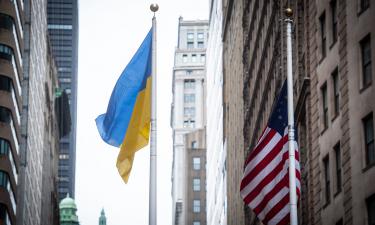Our answer to the Baltic Republics
Vladimir Putin will take part in launching the Ust-Luga se harbor and in opening sea trade a Primorsk merchant harbor in the Leningrad region. This was reported by the president’s spokesman, Alexei Gromov. The president will visit an oil terminal and reserve park, control panel of charge platform, and the system that calculates vessels’ movements.
The Primorsk oil harbor is a unit of the Baltic pipe line system aimed at the export of Russian oil in a roundabout way not using the Baltic Republic’s territory. After the USSR’ disintegration in 1991, the Baltic countries practically became monopolists in transporting goods from Russia to Europe over the sea, because the Russian coast of the Gulf of Finland did not possess serious harbor structures. Today, fees for the shipping of Russian goods make up 20-25 % of the Estonian and Latvian budgets. The oil terminal in Primorsk, together with the channel for tankers to exit into the Baltic Sea, must at least compensate for Russia's losses from using the Baltic countries’ territories. Finally, this “pipe” leading to sea terminal could become one of the main directions of Russian oil export to Europe. Therefore, it could be said that, for the first time since the 1990s, Russia decided to create a competitive transit base for the supplement of its own resources abroad, in the region where the main roles belong to the countries with more profitable positions.
The same could be said about the harbor complex in Ust-Luga. The harbor is a new trans-shipment point that is being created in the Leningrad region. At the moment, the first launch complex of the coal terminal has been finished. In total, 14 terminals are planned to be created, where different kinds of goods will be shipped: coal, wood, metal, and manure.
The economic impact is obvious: the reorientation of Russian exports to these harbours will result in new income for the Russian budget, the income that, earlier, found its way to the pockets of Russia’s Baltic neighbours, in the development of the local infrastructure and appearance of new jobs.
The transit factor should be noticed. Most international transport corridors pass through Russian territory, so it would be stupid not to use them. The transit of goods through Russian territory alone could bring in about 10 billion dollars each year. In addition, thebuilding of the harbors stimulates the economical development of the region.
Political factor should not be neglected as well. About 30-40% of Baltic countries’ economies depend on transit, so they do not want to cede to Russia such a profitable market of transport service.
Therefore, in addition to economical measures (for example, provision to foreign carriers of a more gentle tax regime and the decreasing of rates), they will place political pressure upon Russia. Russia should also remember NATO expansion and the Russian population’s situation in the Baltic Republics and, of course, Kaliningrad.
Dmitry Litvinovich PRAVDA.Ru
Translated by Vera Solovieva
Read the original in Russian: http://www.pravda.ru/main/2001/12/27/35192.html
Subscribe to Pravda.Ru Telegram channel, Facebook, RSS!




